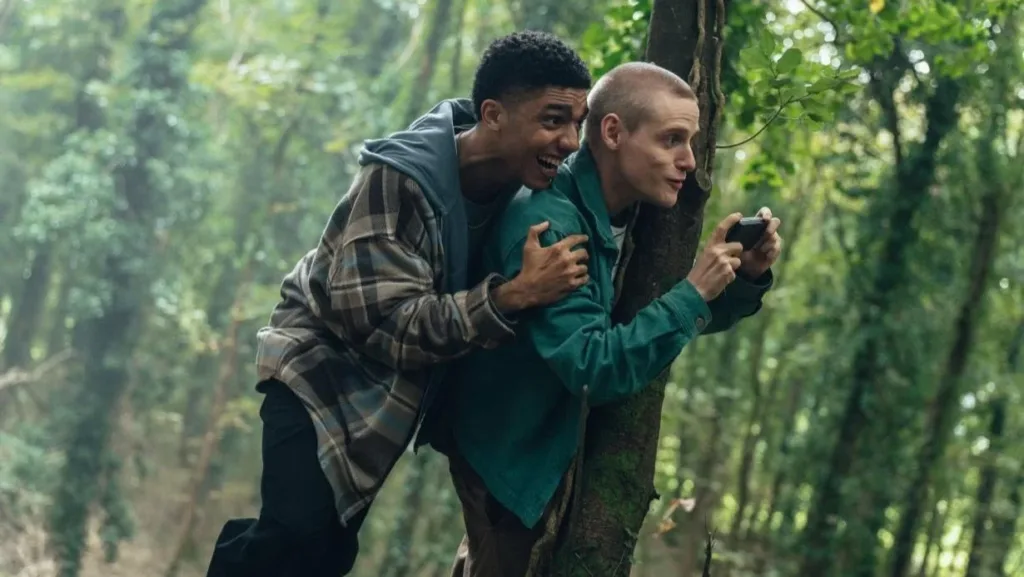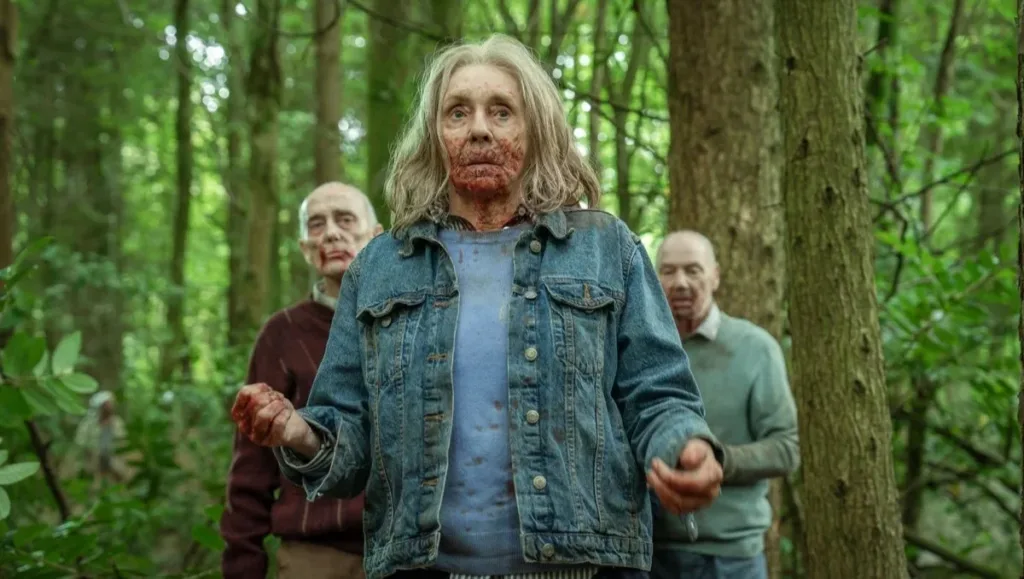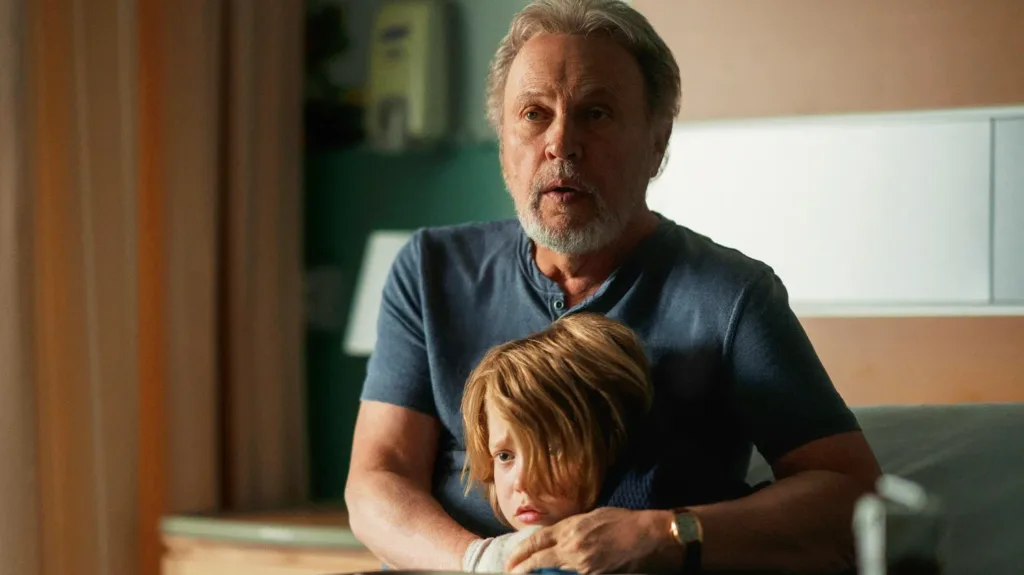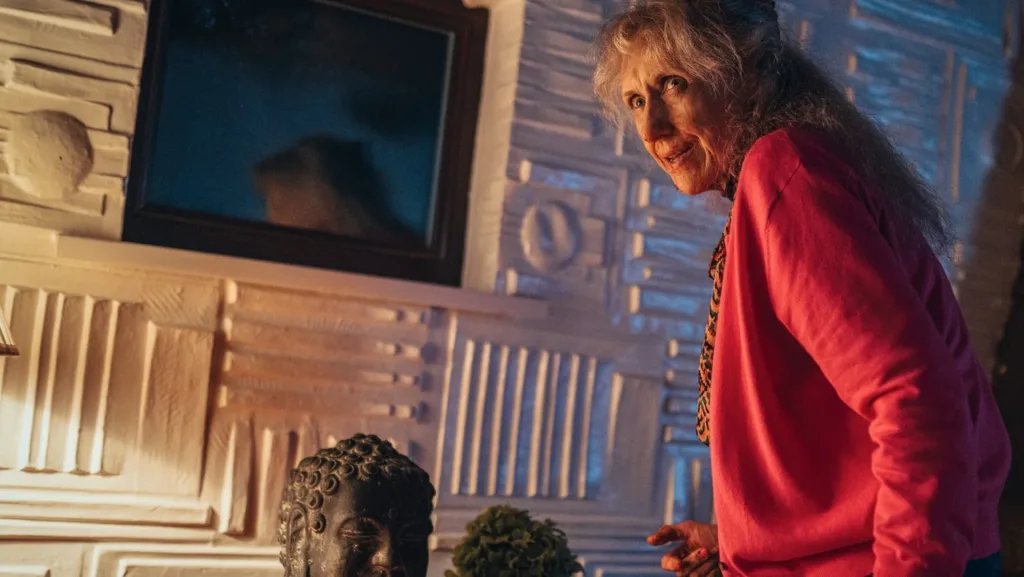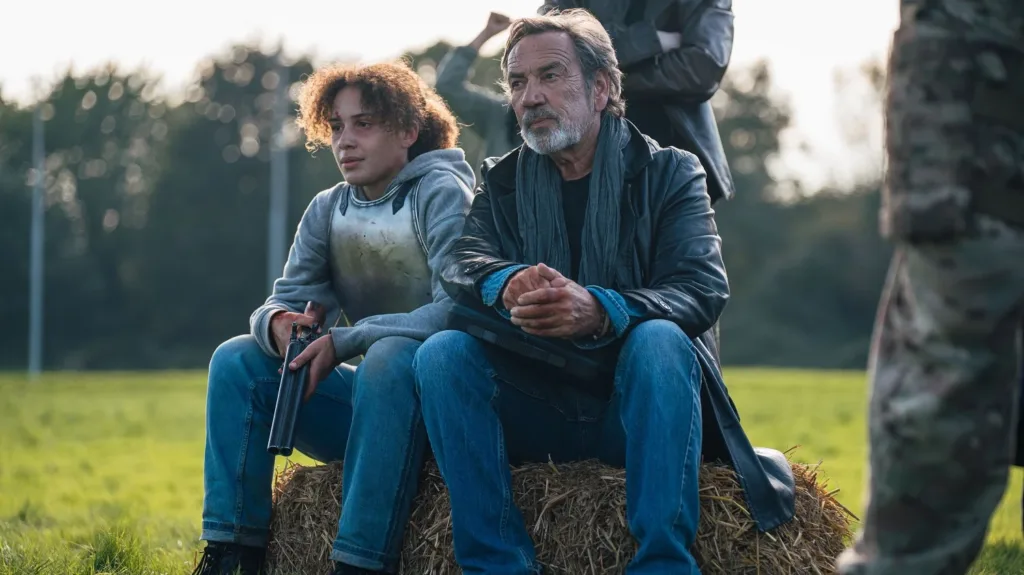They’re not your usual zombies in Generation Z. When a strange substance spills near a care home, the elderly residents who breathe it in don’t sicken—they rejuvenate. But with this new vitality comes an unexpected craving. Director Ben Wheatley takes familiar fears about aging and twists them into something truly chilling.
We’re quickly introduced to the conflict at the heart of the story. Sue Johnston leads the infected seniors thirsting for human flesh. Meanwhile, young people try to understand this bizarre outbreak and protect their families from the rampaging pack. Wheatley establishes the tense dynamics between generations that will unfold over the episodes.
Viewers may recognize Wheatley’s style from his past cult hits like Kill List, blending comic touches with creeping unease. He’s skilled at using genre thrills to examine real societal issues. Generation Z continues this tradition by mirroring concerns around care of the elderly, changing demographics, toxic radicalization online, and more. It seems Wheatley may have predicted certain global events with unnerving prescience.
Loaded with stars and boasting Wheatley’s thoughtful direction, Generation Z promises gripping drama alongside its gory scares. The opening sets the stage for the thoughtful horror to come as tensions between youth and age escalate into a battle for survival. Let’s dig deeper into how this chilling new series confronts modern fears through the premise of reanimated seniors hunting their own bloodline.
Establishing the World of Generation Z
Welcome to the quaint town of Dambury, home to both the youngsters at the center of this story as well as those whose lives will take a strange turn. At first glance, it seems an ordinary English hamlet, but soon darker forces will emerge and tensions mount between generations.
We’re introduced to sixteenth-form friends like Kelly, played by Buket Komur—an independent young woman escaping a difficult home life. Her ex, Charlie, acted by Jay Lycurgo, still cares deeply for her despite their split. Lewis Gribben brings charm as Stef, who finds purpose in serving as caretaker to his friends despite his own insecurities.
On the other side of the generational divide are residents of the retirement community like Sue Johnston’s Cecily. Although eldery, she and her peers harbor a secret that will shock the village. Anita Dobson terrifies as Kelly’s brash nan Janine, always speaking her mind—perhaps to her later detriment.
Providing guidance amid the turmoil is Robert Lindsay’s character Morgan. An avuncular figure to all, his past activism and questioning mind make him a confidant, especially to the parentless Finn.
Over the opening episodes, we see these characters settle into routines of love, family, and community. But then strange symptoms emerge in the elderly. As the threat escalates, so too do tensions between those distrusting the new order and those eager to cling to regained vitality—setting the stage for danger ahead.
Reflecting Real World Troubles
Generation Z sinks its teeth into more than just flesh, also taking aim at various issues plaguing society. Chief among its targets is the overarching intergenerational divide seen through the lens of decaying towns and clashing cultures.
The infected gain unusual vitality through their condition, using it to pursue wants long denied. In this way, the show mirrors how autonomy and freedom were seized amid much recent upheaval. There’s also striking prescience to scenes almost prophesying aspects of the pandemic, from disrupted education to distrust of authorities.
Conspiracy theories swarm thicker than the rampaging seniors. Their existence says something about society’s fraying trust in institutions and need for control. Meanwhile, younger characters face struggles like lack of opportunities, online radicalization, and family dysfunction.
It’s thought-provoking how a zany premise unpacks weighty topics from Brexit fallout to political sidelining of the elderly. A commentary on disconnects within our society as told through this community battling its own fraying social bonds. The massive cast, ranging from national treasures to new talent, ensures a spectrum of perspectives.
Through escalating tensions between those craving a regain of past power and today’s youth protecting their future, Generation Z sinks in sharp social commentary alongside over-the-top gore. All with a humorous slant, making its satire more palatable.
Captivating Characters
One thing is clear from the start: this show’s characters will keep you glued to the screen. The young leads take these roles and make them their own, crafting nuanced, realistic portrayals that go far beyond basic character types.
Particularly impressive is Lewis Gribben as the conflicted Stef. His layered performance draws you deep into Stef’s inner turmoil, brimming with vulnerability yet hints of untapped strength. As his character evolves episode to episode, Gribben seamlessly brings even the subtlest shifts to life.
Sue Johnston is a standout in the older cast as the misunderstood Cecily. Freed from her usual “gentle gran” roles, Johnston revels in Cecily’s new abilities while touching in more vulnerable moments. Her humanity remains even as instincts transformed.
A highlight across the entire cast is Robert Lindsay’s Morgan. With equal parts swagger and softness, Lindsay owns every scene. His warm, sage presence provides the perfect balance to the madness unfolding around him.
Generation Z continuously exceeds by getting the best from its sprawling, multi-talented troupe. Refreshing British favorites alongside rising stars, all are given space to craft living, breathing people rather than caricatures. Their ensemble is a character in itself, carrying the layered narrative superbly.
Between the burgeoning newcomers’ deft subtleties and veterans unleashed from typecasting, Generation Z’s people are truly its greatest asset. Their engaging interactions and inner lives will keep drawing you deeper into this unforgettable world.
Mastering mood and mayhem
Wheatley displays deft control over Generation Z’s constantly shifting tones. Gory zombie-chomping sits side-by-side with poignant drama and crass humor with hushed horror. Yet each transition feels natural instead of jarring.
At times the showcrafts taut suspense worthy of Wheatley’s cult thrillers. Episodes steadily ratchet up chaos through the residents’ deteriorating survival calls. From sardonic one-liners amidst carnage to Cecily’s chilling gang-leading grim chants, isolated scenes plunge viewers into sheer terror before lightening the mood.
Setting also plays a starring role. The expansive fields and forests surrounding Dambury become another character, trapping townsfolk within spreading panic. Authentic rural locales accentuate the creeping isolation.
Wheatley pays homage to classics like Threads and Romero while stamping Generation Z with his signature unnerving directorial touch. From jerky handheld shots to lingering close-ups so intimate you fear exposed necks, hesitating to breathe might keep characters safe.
Yet some subplots fall flat, and inconsistent tones in a few episodes disrupt momentum. But craftsmanship prevails—by the series’ somber conclusion, any initial missteps feel forgivable. Wheatley masters balancing chills, laughter, and poignant social insights into a cohesive, compulsive whole.
Exploration and Evolution Over Episodes
One advantage of the television format is time for narratives and characters to breathe across episodes. Generation Z dives deep into examining its people.
Certain side tales could’ve been trimmed, like one involving Charlie’s mother feeling underdeveloped. But these speedier middle installments are forgivable thanks to the rich groundwork laid.
Wheatley tightens the screws by the finale through a ramping sense of dread. Hints are scattered throughout to slowly permeate, keeping viewers invested in resolutions for complex characters.
From the introduction of memorable figures to their stirring conclusion, the bookends showcase Wheatley’s deft control of longform storytelling. Generation Z whets appetites for where the cast may evolve.
The director suggests future seasons could transform genres while maintaining this community at their heart. An intriguing prospect, as the outbreak necessarily evolves too.
Generation Z proves television allows exploring societal issues and their impacts on individuals at an absorbing pace film cannot match. The enduring characters and their uncertain fates leave viewers eager to witness how this speculative world, and those within it, may transform next.
A thought-provoking horror worth your time
All in all, Generation Z proves a fascinating hybrid marrying mind-bending scares with resonant social insight. While not flawless, Wheatley’s mastery of atmosphere and character keeps viewers hooked.
The escalating dread perfectly builds suspense right through unpredictable twists. Combining horror and humor adds rewatch value as clues to resolutions may be glimpsed on second viewings.
Most impressively, Wheatley taps key issues still relevant in today’s divides. Generation Z’s exploration of disconnects within communities leaves lasting impact beyond its moment.
With the director hinting that changes in the infected’s state open up plot flexibility, there’s potential for riveting further seasons. New genres could bring fresh thrills while upholding compelling characters at this story’s heart.
Memorable performances and Wheatley’s unflinching direction keep you peering through fingers during the goriest scenes. Engrossing from start to stimulating end, Generation Z proves an unforgettable genre-bending feat.
For those seeking intelligent scares interlacing with real-world resonances, this assuredly delivers. Overall, it’s a thought-provoking horror well worth carving out time to enjoy. Fans of the form would be remiss to overlook this gem.
The Review
Generation Z
Generation Z is an expertly crafted genre hybrid that satisfies as both gripping entertainment and unsettling social commentary. Director Ben Wheatley balances horror, humor, and character drama to perfection across a multi-faceted narrative and stellar ensemble cast. While not without flaws, the series' unflinching social insights and escalating tension keep viewers enthralled from start to unpredictable finish. It proves itself a thoroughly memorable small-screen achievement well deserving of its cult status.
PROS
- Expert direction and suspenseful storytelling by Ben Wheatley
- Deep exploration of relevant social themes and generational divides
- Terrific performances from both established and newcomer cast members
- Unpredictable plot twists and amplified tension as stakes escalate
- Memorable characters and their nuanced portrayals over episodes
CONS
- Some meandering mid-season subplots
- Occasional inconsistencies in comic and dramatic tones
- Not all storylines and plot points feel fully resolved









































